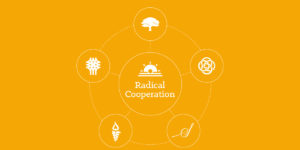In his latest article for the Forbes Nonprofit Council, The Community Solution President Michael Horowitz, Ph.D., addresses the opportunities leadership changes present to organizations, and what can be done to prepare. Read the full article here.
Staff
Dr. Horowitz on Forbes: “Borrowing from Business: Continuous Improvement in Higher Education”
TCS President Dr. Michael Horowitz, Ph.D., recently published his latest article for the Forbes Nonprofit Council. In “Borrowing from Business: Continuous Improvement in Higher Education,” he shares his perspective on the importance of enhancing student success while optimizing efficiency through continuous improvement and outlines several key principles on this topic. Read the full article here.
Dr. Horowitz on Forbes: “The Myth of the Blank Slate: Why the Principles of Andragogy Deserve Our Attention Now More than Ever”
TCS President Dr. Michael Horowitz, Ph.D., recently published his latest article for the Forbes Nonprofit Council. In “The Myth of the Blank Slate: Why the Principles of Andragogy Deserve Our Attention Now More than Ever,” he shares his perspective on the importance of learning through lived experience, applied skills, discussion, and practical problem-solving.
Informed by the success of students and institutions within the TCS community, Dr. Horowitz argues the inherent value of andragogy over pedagogy as a more inclusive, more effective educational philosophy to support today’s learners. Read the full article here.
Dr. Horowitz on Forbes: Three Principles to Embrace for the Future of Higher Ed
Our very own President Michael Horowitz was recently accepted into the Forbes Nonprofit Council, an invitation-only community for leaders of successful nonprofit organizations. In his first article published for the Council, Dr. Horowitz shares insights from a decade of TCS leadership and explores how these ideas might translate to the higher education sector more broadly during the period of post-pandemic recovery and transformation. Read the full article here.
Dr. Horowitz on Changing Higher Ed
Dr. Horowitz was recently featured on the Changing Higher Ed podcast. He spoke about problems in higher education models currently, and how The Community Solution is working to address these through collaboration. Listen here:
TCS Education System welcomes new Vice President of Academic Affairs
Leanne Wruck, Ph.D., joins TCS following a 16-year career at Argosy, where she worked as Vice Chancellor of Academic Affairs.
By TCS Education System
 Leanne Wruck, Ph.D., has had an unconventional path to higher education—sprinkled with positions at Sprint, Dataserve, and Hallmark and driven by mentors—that led her to TCS Education System.
Leanne Wruck, Ph.D., has had an unconventional path to higher education—sprinkled with positions at Sprint, Dataserve, and Hallmark and driven by mentors—that led her to TCS Education System.
“I wouldn’t change anything about my path, because every decision I made led me to where I am right now,” says Dr. Wruck, who joined the Chicago office in February 2019.
Dr. Wruck currently oversees the Office of Institutional Research, Academic Program Implementation, Compliance and Records, Library and Information Resources, Instructional Design, Education Technology, and Data Analytics. Her team has a role in each part of the student life cycle: from the time they request information from one of our partner universities (academic operations), to when they complete their degree and enter the workforce as a distinguished alumnus.
Along the way, developing strong relationships is part of what continued to propel her. Whether it was professors in college telling her she should be a teacher, to someone at Hallmark inspiring her to build up her technical skills, to her manager at Dataserve encouraging her to take IT classes, to her time at Sprint, which inspired her to pursue a doctorate in education, Dr. Wruck has taken every opportunity with gratitude.
Prior to joining TCS Education System, Dr. Wruck spent 16 years working at Argosy University from Director of Curriculum and Instruction, to the Vice Chancellor of Academic Affairs. She built the position and her teams at Argosy from the ground up, pouring “blood, sweat, and tears” into the process. While there, she helped with reaccreditation, facilitated mock WASC campus and administrative office visits, digitalized all textbooks and the course catalog, and changed the entire faculty model to align with industry standards to help give them more structure.
This led to the latest stage of her career, one that combines all of her skills in an ideal balance: leading academic affairs for a multi-institutional higher education organization.
While at Argosy Dr. Wruck was responsible for establishing many critical organizational structures, but at TCS she has inherited teams that already have a solid foundation. Dr. Wruck views this as an opportunity to see things from a different perspective—using past experiences to ask questions and challenge existing processes. It’s this background and inquisitiveness that will help to further TCS’ model.
“If you see a gap, you ask around to make sure no one is working on the gap, and then come up with a solution to fill the need,” Dr. Wruck says. “It keeps me going.”
Dr. Wruck already sees ways to expand TCS’ mission, while continuing to learn herself. She’s aiding the system to vet additional potential partnerships, a side of the business she has never experienced before. Dr. Wruck is also meeting with the leaders in her department to reimagine how TCS can support the colleges’ academic structures, and how they can be better and stronger.
Dr. Wruck is excited to work with a company that has such a strong mission. She admires the strong leadership and clear vision that Michael Horowitz, Ph.D., has for TCS, and sees a long future for herself here.
“TCS has an impressive collection of people that have come together to form this impactful working model,” Dr. Wruck says. “I am excited to get to know the people here and to help strengthen, advance, and grow our system and our mission.”
Key Questions to Answer Before Seriously Considering a Merger
By: Michael Horowitz, Ph.D.
This article originally appeared in the Chronicle of Higher Education on October 21, 2018
In a higher-education landscape marked by an increase in college closures and an uncertain future for some of those able to keep their doors open in the short term, institutional mergers are top of mind for many. It’s imperative, however, to weigh options for institutional survival beyond just cost-cutting and program expansion. Drawn from nearly 10 years of experience gleaned at the front line of the college-closure crisis through more than a hundred conversations with officials of struggling colleges and universities, TCS Education System President Dr. Michael Horowitz recommends five key considerations as these opportunities are entertained.
Do our institutions have mission alignment? Consider whether the merger you’re exploring supports or dilutes your colleges’ missions and identities, whether college names or institutional traditions. This is crucial to creating successful academic pairings. When examining alignment, collaboratively decide what’s important by identifying how the institutions complement each other, what your college offers a potential partner, and what institutional deficits each college helps to resolve. Mergers that fall short of equal, collaborative partnerships can quickly result in fractured culture and control inequities that cause everything to disintegrate. There is no shortage of deals gone south as a result of disproportionate control.
What is my institution’s financial reality? This fundamental question will help distinguish between 11th-hour financial dire straits and potential opportunities for a strategic turnaround. In higher education, the two best qualifiers of relative financial health are operating results and the balance sheet.
Take a hard, comprehensive look at your financials for the past five years and what you expect for the next five. Will you conceivably have the assets to deal with infrastructure, buildings, and bond expenses? Are you positioned to keep up with lender covenants on revolving debt? What are the surplus and loss positions in your operating budget?
If you’re unable to run a surplus for the five-year period ahead, you are at serious risk. In every case, an unbiased, external examination of your financial state, with involvement by the governing board’s finance committee, is recommended to reveal your current reality.
How might existing institutional assets be leveraged for growth? In this tumultuous higher-education climate, many colleges are operating on the assumption that a break-even financial state is the goal. However, to survive — if not thrive — requires consistent investments in innovation to drive enrollment and growth.
Rarely can sizable investments to launch a groundbreaking academic program or meaningfully upgrade a digital platform to attract more students be viably financed by scrimping, saving, and cobbling funds together from already tight operating budgets. More often than not, they require universities to make creative use of their institutional assets.
Evaluating how your assets can be maximized for growth requires you to get past previously conceived notions. Do you have aging campus real estate that you’re emotionally beholden to, based solely on its storied history and connection to your community? Can those beliefs be overcome for the asset’s sale to finance your college turnaround through debt elimination and academic innovation?
Are there options besides merging? Mergers can be an attractive option for financially struggling small to midsize colleges. But before making the commitment, consider alternative resources and partnership opportunities that are available in the form of outside service providers, college consortia, and college systems. Whether IT management, group health-insurance plans, marketing services, or retirement funds, merger alternatives exist with varying degrees of structural and cultural change.
For some colleges, collaborations can be the best option. Some benefits are that institutions can preserve their autonomy, including maintaining their distinct mission, history, board of trustees, and important, their brand, which engenders loyalty and long-term support. Collaboration also creates a spirit of generosity instead of competition, and an environment of academic community in which opportunities for innovation are central. Instead of lobbying to advance legacy academic programs in a merger scenario and vying for funds to do so, the focus of collaborative partnerships is on what can be done together using common platforms, like shared courses and dual degrees.
What is my institution’s current capacity for academic innovation? Are the necessary resources to drive enrollment or student success through programmatic innovation in place? If not, are they within reach? Fueled largely by your standing partnerships and relative financial health, answering this question can help identify the best strategic option for your institution in the long term.
Unfortunately, where there is a will, there is not always a way. A candid evaluation of the steps toward academic innovation available to you — whether from academic deans or instructional-design teams or online platforms — and the affordability of acquiring what you don’t have can quickly narrow down your options and clarify how attractive a merger may be for your institution.
As higher education evolves at an accelerating pace, few institutions will maintain the extended luxury of operating as islands, without the benefit of others’ resources. The most successful players on tomorrow’s playing field will be those that evaluate the alternative institutional models available to them, and make distinctions between the merits and viability of mergers and cooperatively banding together with others. While this process is, of course, different for every institution, one thing remains constant: A broader view is needed to realize a more promising future.
A TCS Agent of Change in The Making: First Generation College Student, Marylin Marquez Orellana
By Dr. Michael Horowitz
 At the very center of the TCS Education System mission to create change agents that serve the global community are our partner college students. The individual strides they each make to favorably impact local communities during their education and throughout their lives elevates our entire System to make a meaningful impact around the world. Seeing the successful rise of each individual TCS student Agent of Change is what drives us, and especially so when those change agents are the first in their families to attend college – as either the children of U.S. immigrants, or immigrants themselves. Their passionate path to make the world a better place is not only inspiring to our entire TCS community, but often enthusiastically rewarded with financial support in the form of a Jeannie and Michael Horowitz Scholarship award to further fuel their academic goals. One of these inspiring Agents of Change is International Psychology doctoral student, Marylin Marquez Orellana of The Chicago School of Professional Psychology.
At the very center of the TCS Education System mission to create change agents that serve the global community are our partner college students. The individual strides they each make to favorably impact local communities during their education and throughout their lives elevates our entire System to make a meaningful impact around the world. Seeing the successful rise of each individual TCS student Agent of Change is what drives us, and especially so when those change agents are the first in their families to attend college – as either the children of U.S. immigrants, or immigrants themselves. Their passionate path to make the world a better place is not only inspiring to our entire TCS community, but often enthusiastically rewarded with financial support in the form of a Jeannie and Michael Horowitz Scholarship award to further fuel their academic goals. One of these inspiring Agents of Change is International Psychology doctoral student, Marylin Marquez Orellana of The Chicago School of Professional Psychology.
Marylin is motivated by her immediate family’s traumatic history in El Salvador and their subsequent U.S. immigration experience. She aspires to serve the Latino community in Washington, D.C., and reframe immigration trauma as a human rights issue to ultimately shape U.S. public policy and advance resilience among those impacted. As not only the first in her family to pursue post-graduate education—but the first to earn an undergraduate degree, she strives to make a meaningful difference in these respective areas nationally and internationally through Latino population research.
Born in Washington D.C. as the eldest child of El Salvadorian immigrant parents, Marylin’s exposure to her family’s traumas had a profound impact on her life and desire to make a difference in the community. Her father and mother both fled from El Salvador during the 12-year civil war in the 1970s and 1980s. The fifth of six children born into poverty, Marylin’s father dropped out of school in the second grade to work 15 hour days as a land tender for the wealthy to help support his family. At 15 he enlisted in the El Salvadorian military in an attempt to overcome poverty, where he fought in the Salvadorian and Honduran 100-hour war, and witnessed the 1979 San Salvador Cathedral massacre. Having learned that guerilla soldiers were actively seeking past and current military soldiers for execution, he fled to the United States. The oldest of nine children born to a well-respected, middle-class family in El Salvador, Marylin’s mother was a freshman in college studying nursing when she was captured by guerilla soldiers and held for three days. Able to escape only with the help of her uncles, who were captains in the Salvadorian military, she was forced to flee the country within 72 hours of her high profile escape with her father, leaving the rest of the family behind.
While these traumas were substantial, Marylin came to learn that her parents’ trauma did not end with their escape from El Salvador. In fact, they were compounded by trauma inflicted during their migration journey to the U.S., and by assimilating to a new way of life in a new country peppered with discrimination and other injustices. A common experience among immigrants from Central America during the 1970’s and 1980’s, this shared history has inspired Marylin through her doctoral program to identify the distinct stages of trauma within cultural contexts to facilitate new therapeutic psychological methodologies.
On her path to fulfilling these goals, Marylin is already working with Central American immigrant families that have suffered war, gang violence, and migration and acculturation-related traumas as a licensed mental health counselor. Her advocacy for the Latino population doesn’t end there, however. On a volunteer basis, Marylin also serves as a Catholic church support group leader for Latino youth dealing with issues related to migration, acculturation, relationships, peer pressure, and social media.
The breadth and depth of Marylin’s commitment and service to others is the hallmark of our shared mission at TCS, and the linchpin of our collective efforts to be The Community Solution in higher education. We’re proud to have her as a vital member of our TCS community, and look forward to watching the meaningful difference she is well-positioned to make in the world!
TCS NAFSA 2018 Welcoming Week Proclamation
By: Michael Horowitz
Our System’s success depends on making sure that all students feel welcome. Today, students and scholars from all over the world are a vital part of our community — bringing fresh perspectives and new ideas, leading clubs and organizations, and contributing to the vibrant diversity that we all value. This week, we honor the spirit of unity that is bringing neighbors together across our colleges from Los Angeles, California to Washington, D.C.
During Welcoming Week, I invite all TCS Education System students to join this movement of colleges nationwide by renewing our commitment to our core American values and by taking action in the spirit of welcoming. By working together, we can achieve greater understanding and make our System the kind of place where diverse people from around the world feel valued and can learn in harmony with their fellow students.
Regardless of where we are born or what we look like, we are students of TCS, united in our efforts to build a stronger global System and greater future. By recognizing the contributions that we all make to creating a vibrant culture, we create a more prosperous and inclusive community for all who call it home. Let us come together to build campuses where every student has the opportunity to contribute at his or her best. Let us come together to create more unified communities and to reaffirm that TCS Education System still stands as a beacon of education and opportunity. Now, therefore, I Dr. Michael Horowitz, by virtue of the authority vested in me as TCS Education System President, do hereby proclaim the week of September 14th, 2018, Welcoming Week. I call upon the people of The Chicago School of Professional Psychology, Pacific Oaks College and Children’s School, The Santa Barbara & Ventura Colleges of Law, Saybrook University, and Dallas Nursing Institute to join together to build stronger communities across Chicago, IL, Los Angeles, CA, Washington D.C., Pasadena, CA, San Jose, CA, Santa Barbara, CA, Ventura, CA, Oakland, CA, Seattle, WA, Dallas, TX, and every community in between and beyond that our colleges touch in service.
Want to Thrive in Higher Ed? Practice “Radical Cooperation”
Note: This content originally appeared on May 31, 2018 in University Business Magazine, by Dr. Michael Horowitz
In a higher education landscape marked by a shrinking student population and increasing uncertainty, institutional longevity—if not short-term survival—is top of mind for most. What many at-risk institutions fail to see, however, is that a primary focus on competition is a precarious survival strategy that more often than not, backfires. Cooperation, not competition is the way out. Read the full Professional Opinion piece in University Business Magazine here.





